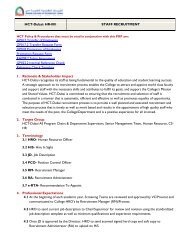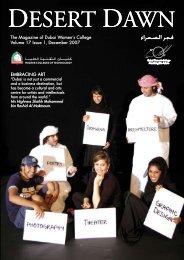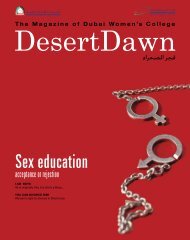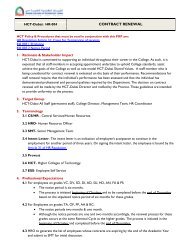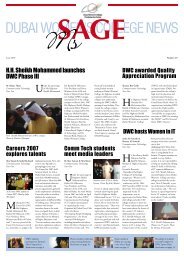The unrevealed trauma - Dubai Women's College - Higher Colleges ...
The unrevealed trauma - Dubai Women's College - Higher Colleges ...
The unrevealed trauma - Dubai Women's College - Higher Colleges ...
Create successful ePaper yourself
Turn your PDF publications into a flip-book with our unique Google optimized e-Paper software.
12 13<br />
What is your mother’s name?<br />
SHAIKHA AL AYALI<br />
Is a woman’s name forbidden? Shaikha Al Ayali/DWC<br />
<strong>The</strong> house bell rang. An invitation<br />
was given to me from one of our<br />
relatives. Exciting! It was a silk<br />
wedding invitation box decorated<br />
by a card adorned with a crystal<br />
buckle and golden ribbon A classic<br />
invitation with an elegant font<br />
type, but who was the bride? Was<br />
it Sara’s or Mariam’s wedding?<br />
<strong>The</strong>y both were engaged.<br />
Omitting the woman’s name is<br />
not a unique story that belongs<br />
to a specific person or group<br />
of people. It has been practiced<br />
for a long time and has become<br />
a custom within the Arab world,<br />
specifically the Gulf region.<br />
<strong>The</strong> traditions that appeared in<br />
the era of ‘ignorance’ (Jahiliah)<br />
still influence some men’s behavior<br />
today. Until now, some men feel<br />
shy to mention their mothers’,<br />
sisters’, or wives’ names in front<br />
of other men. <strong>The</strong>y often use<br />
expressions to hide the woman’s<br />
identity. Instead of using her<br />
given name, he refers to her as:<br />
the family, the children, or ‘al<br />
radeea’a’ which means ‘my sister’<br />
in Emirati society.<br />
Some men believe that saving<br />
a woman’s name on their mobiles<br />
will put them in a sensitive<br />
situation if any of their friends<br />
read her name on an incoming<br />
call. This attitude affects young<br />
boys’ behavior towards their<br />
relatives. For instance, in the<br />
Arab culture, calling a young boy<br />
by his mother’s name is embarrassing<br />
to him.<br />
This behavior by some men is<br />
not well-received by many women.<br />
Afra Atiq, 22, is a university student<br />
who sees such behavior as rude. “I<br />
think we are past the tribal days of<br />
women’s names being taboo. I have<br />
worked hard to get where I am. I<br />
am not inferior to anyone so why<br />
not use my name?”<br />
Although education has helped<br />
change some of these behaviors,<br />
still there hasn’t been great<br />
improvement. Despite all the<br />
progress of civilization, we still<br />
suffer the impact driven from<br />
the pre-Islamic era of ‘ignorance.’<br />
Neglecting the woman’s name is<br />
a cultural contradiction, where<br />
a woman has been given a name<br />
and subsequently had it taken<br />
away from her. Still, some men<br />
overreact.<br />
Government employee Rashid<br />
Al Muhairi, 27, had a fight with<br />
one of his friends when the friend<br />
asked Al Muhairi about his<br />
mother’s name. “I was embarrassed<br />
when he asked me in front<br />
of my friends.” He believes there<br />
is no need to disclose the name of<br />
his mother, sister or wife because<br />
it is personal; unless it is necessary<br />
to spell it out on an application<br />
form.<br />
University student Salem Al<br />
Hammadi, disagrees with Al<br />
Muhairi. “I strongly believe that<br />
the name doesn’t affect the woman<br />
directly, there is no logical reason<br />
not to pronounce a woman’s name.”<br />
Al Hammadi stresses that calling<br />
each woman by her name is a<br />
way to show her the respect she<br />
deserves. Arguing with that,<br />
Shamma Abdullah, housewife,<br />
admits that some behavior and<br />
reactions from men make her<br />
uncomfortable to hear her name<br />
spoken out loud in public. “It<br />
is annoying when some young<br />
boys don’t take people’s names<br />
seriously and they just make fun<br />
of them, especially when it’s one<br />
of the old names in our society,”<br />
she says.<br />
In the local culture, withholding<br />
the woman’s name is considered<br />
a way to preserve her dignity.<br />
A woman will have more value<br />
under her husband’s or father’s<br />
name, or in reference to her oldest<br />
son like ‘Um Mohammad’.<br />
However, these practices do not<br />
honor the most basic rights of<br />
women. Instead, men should<br />
pronounce women’s names in<br />
front of others respectfully and<br />
proudly.<br />
<strong>The</strong> Holy Quran was written over<br />
1400 years ago. It has Surah 19:<br />
Maryam (Mary) titled by a woman’s<br />
name. Islam honors women and<br />
their rights and protects them<br />
from injustice. Anas Bin Malik<br />
narrates: “We arrived at Khaibar.<br />
I saw the Prophet, making for<br />
Safiya ‘the prophet’s wife,’ a kind<br />
of cushion with his cloak behind<br />
him [on his camel]. He then sat<br />
beside his camel and put his knee<br />
for Safiya to put her foot on, in<br />
order to ride [on the camel]. He<br />
didn’t feel shy about his soldiers<br />
observing the scene, and when<br />
everyone else only whispered<br />
the names of their women, our<br />
prophet stated his wives’ names<br />
and showed his love in front<br />
of everyone.”<br />
(THE HOLY<br />
QURAN) HAS<br />
SURAH 19:<br />
MARYAM (MARY)<br />
TITLED BY A<br />
WOMAN’S NAME.<br />
ISLAM HONORS<br />
WOMEN AND<br />
THEIR RIGHTS<br />
AND PROTECTS<br />
THEM FROM<br />
INJUSTICE.<br />
<strong>The</strong>re is additional evidence from<br />
Shari’ah when Amr bin Al’Aas<br />
asked the Prophet: “O, Prophet<br />
of Allah whom do you love the<br />
most?” “Ayesha,” he replied.<br />
“And whom do you love the most<br />
among the men?” “Her father,” the<br />
Prophet said. (Hadith in Bukhari)<br />
“<strong>The</strong>se days men don’t think to<br />
mention the names of any women<br />
in their family; they just point to<br />
them using different ways, ignoring<br />
the way women feel about<br />
it,” says Dr. Mohammad Al Olama,<br />
chancellor of the <strong>College</strong> of Law at<br />
United Arab Emirates University.<br />
However, thousands of years ago,<br />
when the Prophet Mohammed was<br />
sitting in an open area with some<br />
men, someone asked about the<br />
name of the woman sitting beside<br />
him. He answered in front of<br />
everyone that she was his wife,<br />
Safia. Al Olama points out that it<br />
is not forbidden in Islam to mention<br />
a woman’s name; all these behaviors<br />
are a result of the era of ‘ignorance.’<br />
<strong>The</strong> Prophet Mohammad<br />
stated the names of his wives and<br />
daughters in front of all strangers<br />
and publicly disclosed his feelings<br />
and love.<br />
Some men assume a female’s<br />
name is an embarrassment that<br />
should not be announced in<br />
public for religious reasons.<br />
However, an understanding of<br />
the teachings of Islam proves the<br />
opposite. This is purely a cultural<br />
belief.





